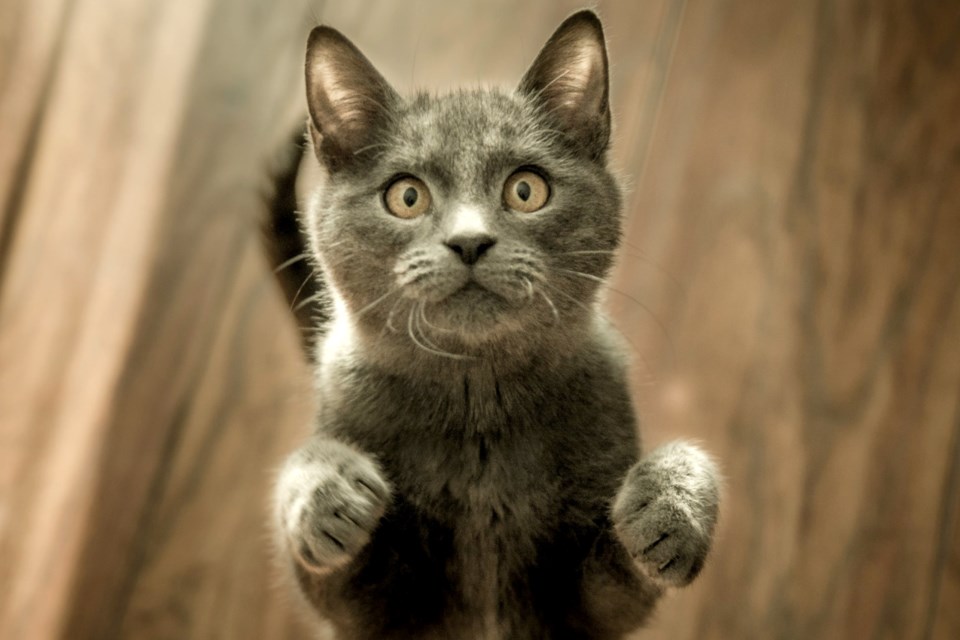What does it mean when your cat is urinating outside of the box?
The most common concern cat owners have when making the trip to the veterinary clinic is that their cat is peeing outside of their litter box.
Whether they are urinating in the sink, on your bed, in the basket of fresh laundry or in the corner of the living room under the chair, it is concerning, not to mention stinky.
Unfortunately, there are many reasons why cats will pee inappropriately. Urinary tract infections, bladder stones or crystals, kidney or thyroid disease, even arthritis or constipation can all potentially cause inappropriate urination. In some cases there is no cause at all, (feline idiopathic cystitis; FIC) or it’s not physical, but behavioural.
If you find your cat is unable to urinate, if they are just going in and out of the box straining but not producing anything, call your veterinarian immediately — this is an emergency.
If the urine can’t get out of the bladder, it can cause the urine to back up and cause damage to the kidneys. The condition can be fatal.
A cat in this condition will likely need to be sedated so they can have a urinary catheter placed and their bladder emptied. Your cat may need to stay in the hospital for a few days to make sure they are able to urinate on their own before they go home.
Differentiating between all these possible causes and getting a treatment plan can take some patience. To start we need three things:
- A thorough understanding of what has been happening at home
- A good physical examination and urinalysis
- Testing a urine sample.
If you find that your cat is urinating outside the litter box, a thorough understanding of what exactly has been happening is the first step. For example: how long has it been happening? Are they urinating large volumes or smaller volumes, and how often is it happening? Are they straining? Have you noticed any blood? Have there been any changes to the home (new pets, construction)?
Your veterinarian will also want to perform a full physical exam. Subtle changes in weight, heart rate and hydration status are important to narrow down the diagnosis. In most cats, your veterinarian can even palpate the kidneys to check size and how smooth they are. We also palpate the bladder to see if it’s thickened, distended or painful. You can even palpate if there are stones present and if they are big enough.
Running a urine sample gives us a lot of information on what is happening in the bladder and helps drive treatment.
The most difficult part is trying to collect it. Collecting a urine sample at the clinic is most likely going to be done by cystocentesis, when we use a needle to collect the urine directly from the bladder. It’s the cleanest way to get a sample as it won’t have any potential contamination, but it does require a lot on the co-operation from the cat. It also requires a big, full bladder at the time of the appointment.
Can you collect a urine sample from your cat at home? Of course you can! Your vet can provide you with little plastic pebbles you can replace cat litter with that won’t absorb the urine so you can just pour it into a container to bring into the clinic.
If your cat does happen to urinate on a hard surface, you can use a syringe to collect it directly off the surface. I have even had some owners wait for their cat to start to urinate and then quickly positioned a ladle in the right spot to collect a sample.
Once we have all this information, it may lead us to further diagnostics or a treatment plan. Treatment can be antibiotics and pain management. Sometimes anti-anxiety medications are required.
Most causes of inappropriate urination can actually be partially if not completely controlled with diet. These diets often tightly control the pH and urine concentration (the more dilute the better), they prevent the formation of crystals which can lead to stones; Even FIC and behavioural inappropriate urination can benefit from specific diets.
If you’ve read my other articles, you know that the best first step when dealing with any concerns you have with your pet is to contact your veterinarian. They will be able to tailor diagnostics and treatment to your pets needs to get them the care they require.
Dr. Courtney Andrews is a veterinarian at Lockerby Animal Hospital, a graduate of the Royal School of Veterinary Studies and dog mom to Argyll and Einstein. Animals & Pets is made possible by our Community Leaders Program.



